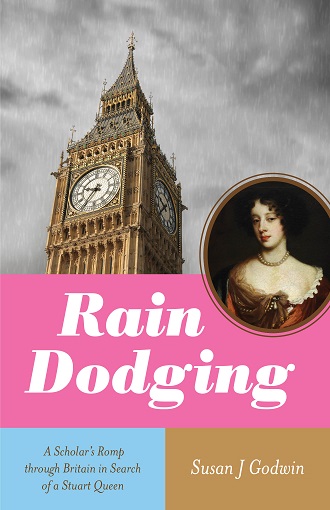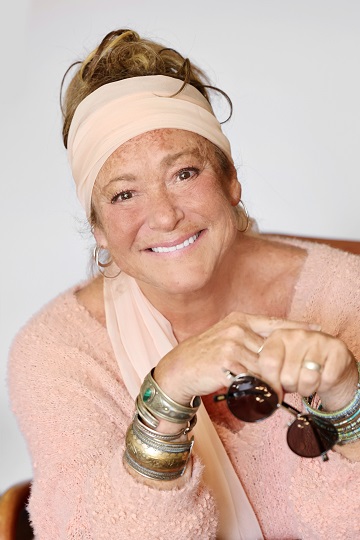Oh, yes. My target reader’s idea of a good time is curling up with a good book that gambols through the Cotswold’s or wanders the streets of London. She longs to live in Great Britain for an extended period, so she relishes adventuring England’s back roads—anywhere in Europe for that matter—through the eyes of solo women travelers: Books give her the encouragement that she, too, could do it alone.
Susan J Godwin – 17 October 2023
The Back Flap
Scholar Susan Godwin is hooked when she comes across the captivating story of Mary of Modena—a seventeenth-century Italian princess who was only fourteen when coerced into marriage with the future king of England, James II, yet went on to cultivate a court full of women writers in an age when female authorship was rare. How did Mary achieve such a feat?
Rain Dodging is Susan’s creative nonfiction account of the years-long search upon which this question—and her own unquenchable curiosity—launched her. Godwin travels through both space and time, solo adventuring through Britain in pursuit of truth and, in a spicy parallel arc, chronicling her own cluttered but resilient feminist path. From schizophrenic lovers to out-there musicians to one unhinged mother, Susan tells the story of her personal enlightenment even as she visits the palaces and manor houses in England and Scotland Mary once inhabited and pores over materials in Oxford’s stunning 400-year-old Bodleian Library, finding moments of transcendence and unexpected delight along the way.
Join Susan in this irreverent and illuminating journey—a fascinating account of the late Stuart monarchy, the progression of feminist history, and the unexpected connection between the two.
About the book
What is the book about?
During a remarkable summer of graduate study at Oxford, I came across a lesser-known 17th century Queen of England—former Italian princess, Mary of Modena—who had several women writers in her court. How did this come to be in the 1600s, an age when female authorship was rare? Rain Dodging chronicles my adventures through England and Scotland to unearth Mary of Modena’s real story—a journey that involves revisiting 17th century British spaces and delving deep into Oxford’s archives. Throughout Rain Dodging, I weave parallel stories of my own resilient, sometimes messy, feminist path.
When did you start writing the book?
The seed germinated in 2012.
How long did it take you to write it?
Off and on, almost 10 years. I was full time teaching.
Where did you get the idea from?
While at Oxford I was studying Anne Finch’s poem Nocturnal Reverie when I stumbled over Italian princess Mary of Modena, married by proxy and against her will in the late 17th century to James, Duke of York, later James II. She had female writers in her court, so unsual for the time. I was compelled to find out how that came to be.
Were there any parts of the book where you struggled?
Some of the family memoir was painful to think about and write about.
What came easily?
Ahhhh, descriptions of my travels. I love words. Sigh.
Are your characters entirely fictitious or have you borrowed from real world people you know?
This book is memoir and history, so they are all real people though some “names have been changed to protect the innocent.”
We all know how important it is for writers to read. Are there any particular authors that have influenced how you write and, if so, how have they influenced you?
I like to think I am a cross between Erica Jong (Fear of Flying (1973), Fanny: Being the True History of the Adventures of Fanny Hackabout-Jones (1980), Fear of Fifty: A Midlife Memoir (1996) and Seducing the Demon: Writing for My Life (2006), Parachutes and Kisses (1984) and British author Antonia Fraser. Mary, Queen of Scots 1969, 1994, Mary, Queen of the Scots, 1974, Royal Charles: Charles II and the Restoration 1979, 1993, The Weaker Vessel, 1984, Wives of Henry VIII, 1992. Marie Antoinette, 2001. Jong is sexy and storng, saucy and sacrilegious, intelligent and irreverent, literary and . . . enough of the alliteration. Jong was the first author I read who questioned women’s roles in our culture. For me, her irreverence is the main attraction. I admire Antonia Fraser’s lively but scholarly approach to narrative style. The pages just keep turning, not always the case when reading research.
Do you have a target reader?
Oh, yes. My target reader’s idea of a good time is curling up with a good book that gambols through the Cotswold’s or wanders the streets of London. She longs to live in Great Britain for an extended period, so she relishes adventuring England’s back roads—anywhere in Europe for that matter—through the eyes of solo women travelers: Books give her the encouragement that she, too, could do it alone.
She is either too young to remember what it was like for women before the modern-day women’s movement, or she is old enough but wasn’t paying close attention. She wants to pay attention now. She is still figuring how she feels about The Invisibility Club. Her daughters get the attention now. My target reader appreciates a writer’s voice with humor and irreverence, even in the depths of misfortune. She relates to life’s arduous, non-linear journey. She needs to be is open-minded when it comes to sex and relationships. Though my target reader keeps current politically and may have a history of social activism, she doesn’t want to read about real-world politics in her downtime. Give her a woman’s travel odyssey, and she is content.
When my target reader visits a bookstore, she is looking for a strong—must be likable—female subject, but her book interests are eclectic. She wants to be enlightened. She wants to be entertained. She loves words and the way they play with one another. Her women friends mean the world to her, but she is just as happy in solitude, reading books.
About Writing
Do you have a writing process? If so can you please describe it?
When I find a topic to consider, first it mulls around in my head for a long long time. I scribble notes as I ask myself questions. As a visual learner, I envisage my reading. The more narrow the focus the better, I have found. Before I commit, I consider:
Is this topic engaging enough for an extended period of time?
Can I find books in the library and journals online?
Is this an original idea?
Part of the joy of research—and for me it is joyful—is the ability to explore freely in contemplation and solitude. Call me old-fashioned, I prefer hard copy books whenever possible: Citations that provide further resources are more easily accessible. Post its, margin notes, underlining, highlighting all reinforce the finger/brain connection. Especially at my age! I have fun going down the rabbit hole.
Researchers may shudder, but I still use Google and just follow the trail. It takes me to websites that will offer other sites and valuable resources. I keep track of the URL’S. I make sure there is time to appreciate the joy of search. For me, there is Nothing like a real library. I rely on Interlibrary Loan (ILL), the service that enables a patron of one library to borrow physical material that are held by another library from practically anywhere. Eventually my handwritten notes take shape; I cut and tape them into order. Then I being on a word document. Somewhere along the way, I would have thought how do I want to open the piece. I dig in.
Do you outline? If so, do you do so extensively or just chapter headings and a couple of sentences?
Sometimes an outline develops but for me it’s OK if one doesn’t. My cut and paste notes serve as a loose messy outline. At some point that gets streamlined. I’m not afraid to mess with it. It’s the 21st century, I don’t need a Pink Pearl eraser:)
Do you edit as you go or wait until you’ve finished?
I can’t resist editing always at the start of a session and usually a handful of times during . . . and at the end of a session!
Did you hire a professional editor?
Yes. I had a talented editor who ended being both a copy and developmental editor for me.
Do you listen to music while you write?
No, I get into the zone without help. I am a former middle school teacher. I can tune anything out!
About Publishing
Did you submit your work to Agents?
I searched for along time for an agent for my YA novel to no avail. That’s when I realized I needed to go ‘back to school’ to learn how the industry had changed.
What made you decide to go Indie, whether self-publishing or with an indie publisher? Was it a particular event or a gradual process?
Attending my first Women in Publishing summit a few years ago, I learned the pros and cons of all three pubishing options: tradtional, hybrid, self. I chose hybrid; it fit my needs the best.
Did you get your book cover professionally done or did you do it yourself?
Professionally. As an artist myself, I had a different concept but I trust that my publisher knows best.
Do you have a marketing plan for the book or are you just winging it?
I hired professional help.
Any advice that you would like to give to other newbies considering becoming Indie authors?
Learn as much as you can by reading and taking workshops; so many are online.
About You
Where did you grow up?
Cleveland, Ohio.
Where do you live now?
Fifty miles west of Nashville, Tennessee, in a renovated hayloft on a sweet river bluff.
What would you like readers to know about you?
I am funny.
What are you working on now?
I am working on PR and advertising, but I have a completed YA novel so after launching Rain Dodging, I will tweak it and then start the process of publishing all over again!
End of Interview:
For more from Susan Godwin visit her website and follow her on Instagram and Twitter.



